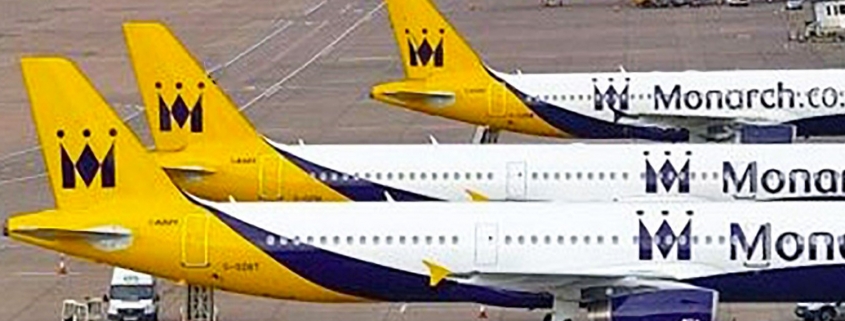How Monarch Monetized Gatwick Slots Post-Collapse
Introduction
Monarch Airlines Limited (“Monarch”) sold its London Gatwick (“LGW”) slots to British Airways for an undisclosed amount on November 24th, reigniting the discussion on airline slot ownership within the aviation community. In order to understand how a bankrupt carrier without an AOC was able to monetize these assets, it is useful to review the court’s hearings on the matter.
Timeline
Septeber 26
- Monarch requests slots at LGW and LUT for S18 season based on equivalent slots during S17
October 2
Monarch is placed into administration
- CAA Provisionally suspends its AOC and proposes to revoke it, along with its operating license
October 24
- ACL informs Monarch of its decision not to allocate the requested slots
- ACL indicates they would reserve them pending the outcome of the decision to revoke its operating license
October 26
- Slots were due to be allocated by ACL
- Monarch applies for judicial review before the Divisional Court
November 8
- Panel Hearing concludes that Monarch’s operating license should be revoked
- Divisional Court dismisses Monarch’s claim to the slots but grants judicial review
- Monarch states that it intends to appeal
November 22
- Court of Appeal decision rules in favor of Monarch and its right to the requested slots
November 24
- Monarch officially trades LGW slots for the S18 season with British Airways
Bankruptcy
On October 2nd Monarch was placed into insolvency administration and the Civil Aviation Authority (“CAA”) provisionally suspended its AOC and proposed to revoke it, along with its operating license. Hearings were scheduled for the proposed revocation of the operating license on November 8th, and for the proposed revocation of the AOC on November 28th.
Initial Ruling
In the November 8th hearing, the panel concluded that Monarch’s operating license should be revoked. The Divisional Court concluded that Airport Coordination Limited (“ACL”), the party in charge of slot allocation at LGW and London Luton (“LTN”), was not under a duty to allocate Summer 2018 (“S18”) slots to Monarch because Monarch was no longer an operating airline. In its view:
“The imposition of such a duty would not accord with the underlying objects and policy of the Slots Regulation or the Licensing Regulation. Furthermore, it is clear that, by 26 October 2017, when slots were allocated by ACL, Monarch was no longer an air carrier within the meaning of the Slots Regulation as it was no longer an air transport undertaking. It therefore fell outside the language of the Slots Regulation.”[1]
Moreover, the Divisional Court had taken into account that Monarch had neither pilots nor aircraft at its disposal, resulting in “no more than a theoretical possibility that Monarch would resume air transport operations again”.
Monarch subsequently appealed the case, bringing it before the Court of Appeal.
Court of Appeal Hearings
At the Court of Appeal hearings, the representative for ACL argued that it would be a paradoxical outcome if a coordinator were to be ordered to allot slots after the licensing authority of the Member State had decided to revoke the applicant’s operating license. During the proceedings, the Court of Appeal sought to answer three central questions surrounding the case to determine its ruling:
- Had (and has) Monarch ceased to be an “air carrier”?
- Should Monarch, even if still an “air carrier”, be denied slots on the basis that allocating them to it would be inconsistent with the purpose of the Slots Regulation?
- Should the Court anyway decline to grant Monarch any relief in the exercise of its discretion?
The Court of Appeal concluded that Monarch was still an “air carrier” when slots fell to be allocated on 26 October 2017 and, in fact, remains one now. The following rationale was given:
- For the purposes of the Slots Regulation it is incorrect to assume that an airline stops being an “air carrier” whenever, and as soon as, it becomes unable to operate air transport services.
- The determination between a carrier being “unable” and “temporarily unable” to provide services is unclear.
- A collapsed airline, even one that has “no realistic prospect of resuming air transport services, can perfectly well be referred to as an ‘air transport undertaking.’” It may be a failed “air transport undertaking”, but that need not stop it being an “air transport undertaking”.[2]
- The Slots Regulation does not contain specific language on the topic.
- The CAA only initially suspended Monarch’s AOC on November 8th, giving Monarch 14 days to appeal the decision, thus expiring on November 22nd. Therefore, prior to November 22nd Monarch would effectively still be in possession of its operating license, including on October 26th, the day when the slots were allocated.
On November 22nd the UK Court of Appeal affirmed the right of Monarch to S18 slots at LGW and LTN. By the court ruling, it can be determined that the current status, not the likelihood of future operation, should be taken into consideration at the time of slot allocation; but moreover there is no clear definition of an “air carrier” and “air transport undertaking” according to the Slots Regulation.
[1] R (Monarch Airlines Ltd) -v- Airport Coordination Ltd, Final Judgement, November 22, 2017, https://www.judiciary.gov.uk/wp-content/uploads/2017/11/monarch-airlines-ltd-v-airport-coordination-ltd-final-judgment-20171122.pdf
[2] R (Monarch Airlines Ltd) -v- Airport Coordination Ltd, Final Judgement, November 22, 2017, https://www.judiciary.gov.uk/wp-content/uploads/2017/11/monarch-airlines-ltd-v-airport-coordination-ltd-final-judgment-20171122.pdf


